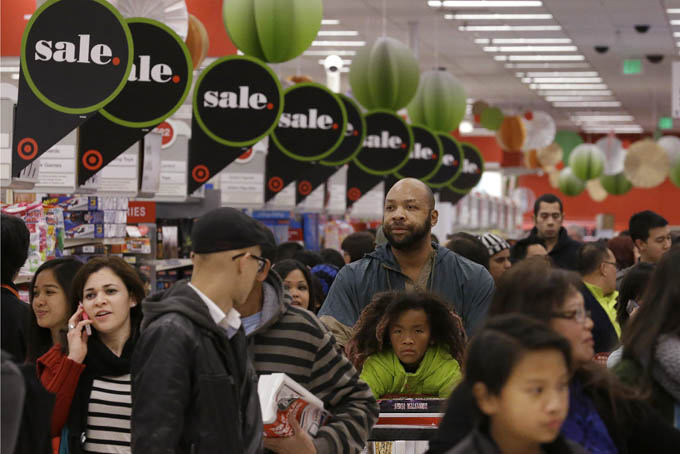
NEW YORK (AP) — Black Friday fatigue is setting in.
Early discounting, more online shopping and a mixed economy meant fewer people shopped over Thanksgiving weekend, according to a survey of shoppers released Sunday by the National Retail Federation.
Overall, 133.7 million people shopped at stores and online over the four-day holiday weekend, down 5.2 percent from last year, according to a survey of 4,631 people conducted by Prosper Insights & Analytics for the trade group.
Total spending for the weekend is expected to fall 11 percent to $50.9 billion from an estimated $57.4 billion last year. Shoppers, on average, are expected to spend $380.95 over the four days, down 6.4 percent from $407.02 last year. That marked the second year in a row spending was down.
Part of the reason is that Target, Macy’s, Wal-Mart and other major retailers pushed fat holiday discounts as early as Halloween and opened stores even earlier on Thanksgiving to kick off the holiday shopping season, stealing some thunder from Black Friday and the rest of the weekend.
The preliminary data also raises worries shoppers remain frugal despite improving employment and falling gas prices.
Matt Shay, the trade group’s CEO, told reporters that the effect of the economy is puzzling, but he believes that people benefiting a recovering economy may not feel the need to fight the crowds to get the deepest discount on a TV or toaster. And those who still feel like they’re still stuck in a recession may not have the money and will stretch out what they spend through Christmas.
“While they’re more optimistic, they’re very cautious,” Shay told reporters during a conference call. “They’re still looking for the deals. If the deals are not right for them, they’re not going to spend.”
Bottom line: Expect more deep discounting, all season long.
“Every day will be Black Friday. Every minute will be Cyber Monday,” he said.
That could be what it takes to get shoppers to open their wallets for the holiday shopping season, which accounts for 20 percent of the retail industry’s annual sales.
Despite an improving economy, high food prices and stagnant wages are still affecting on shoppers.
And people also are becoming more discerning when they shop. Armed with smartphones and price-comparison apps, they know what’s a good deal, and what’s not.
Kimani Brown, 39, of Manhattan, was among the Black Friday defectors. After four years of braving the crowds, he called it quits this year.
“I consider myself a smart shopper. And it’s not as alluring as it used to be,” Brown said. “It’s a marketing tool, and I don’t want to be pulled into it.” He said he looked at the sales and wasn’t impressed.
Moreover, he says he tended to overspend during the Black Friday sales because he got caught up in the frenzy, and he paid the price in January when he looked at his credit card statement.
Instead, he says he will be looking at what is known as Cyber Monday, the online shopping day after Thanksgiving weekend.
And some Thanksgiving shoppers felt they were doing it against their will. Cathyliz Lopez, of New York City, said she was forced to shop on the holiday because they felt the deals were better than Black Friday.
“It’s ruining the spirit of Thanksgiving,” said the 20-year-old who was shopping at Target’s East Harlem store on Thursday. “But I was checking all the ads, and the best deals were today.”
The National Retail Federation is still predicting a 4.1 percent increase in holiday sales to $616.9 billion. That would be the highest increase since the 4.8 percent gain in 2011.
Some stores and malls had reason to be optimistic
Dan Jasper, a spokesman at Bloomington, Minnesota-based Mall of America, said customer counts are tracking up 5 to 6 percent for the four-day weekend. One plus: Shoppers were doing more buying for themselves.
“People were in an optimistic mood,” he said. “They felt confident in the economy.”
CEOs at Target and Toys R Us said they saw shoppers not just concentrated on the doorbuster items but throwing in extra items in their carts. Macy’s CEO Terry Lundgren told The Associated Press that he’s hoping lower gas prices will help spending.
“There’s reason to believe that confidence should continue to grow. That should be good for discretionary spending,” he said.
In a separate report out Saturday, IBM said online sales for Black Friday climbed 9.5 percent over the same day last year. More than one of every four transactions was made using a smartphone or tablet computer.
But the early start pulled sales forward, resulting in sales declines at stores for Black Friday for the second time in a row. Shoppers spent $9.1 billion at stores on Black Friday, according to data out Saturday from research firm ShopperTrak. That’s a drop of 7 percent compared with the same day last year.
Sales on Thanksgiving jumped 24 percent to $3.2 billion from $2.5 billion a year ago. And overall sales for the two days are expected to slip half a percent to $12.29 billion. Those figures don’t include online transactions.